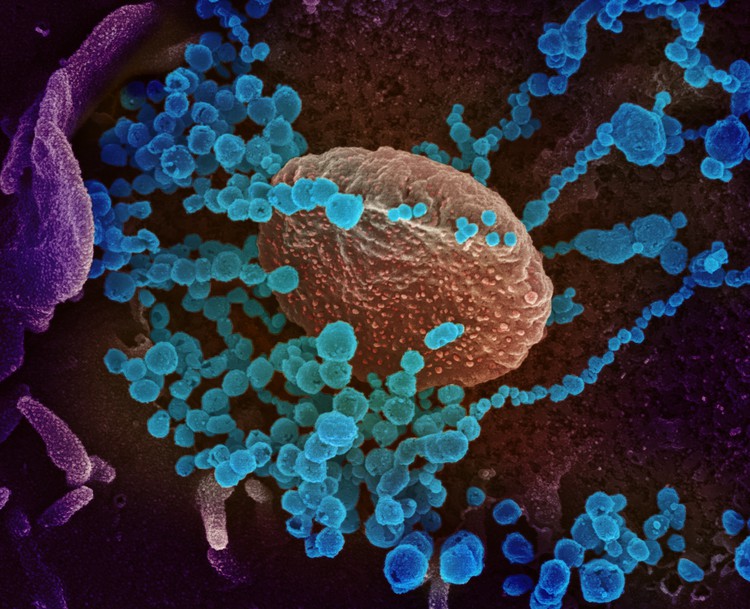
The National Health Laboratory Service said earlier this month that it would be able to test 36,000 people per day by the end of April. (Image of SARS-CoV-2 virions emerging from a cell by the US NIAID, CC BY 2.0)
20 April 2020
The National Health Laboratory Service (NHLS) said earlier this month that it would be able to test 36,000 people per day by the end of April. It set a target of 15,000 daily tests by mid-month. This was excluding private sector testing.
But on 15 April just under 3,500 people were tested in the private and public sectors combined. It has got better the past three days: 5,767 on 17 April, 7,194 on 18 April and 6,690 on 19 April.
On 18 April Minister of Health Zweli Mkhize stated that 108,000 have been tested so far and that about 123,000 tests have been conducted (several thousand people have been tested more than once to see if they’ve recovered or, if they’ve subsequently become ill after an initial negative test). Mkhize clarified that in general government only announces the number of people tested, not the number of tests done.
In any case we are still far short of the targets set by the NHLS. Critical to getting to those targets are the GeneXpert machines currently used to test for TB. As we explained previously, the smallest version of the machine is the size of a desktop computer. It takes four cartridges, where each cartridge is loaded up with sputum from a patient and chemical reagents which allow the machine to detect genetic material of TB, or now coronavirus. It takes 45 minutes to get a result.
As of 2017, South Africa had 314 of these machines. Most have four or 16 cartridges, but there are some with 48 or even 80 cartridges. 180 of the machines will be used for Covid-19.
Dr Kamy Chetty, the NHLS head, said during Saturday’s press conference with the minister, that about 10,000 coronavirus cartridges for GeneXpert have arrived. They are being used to validate the test. She said South Africa is working with the American manufacturer, Cepheid, to expedite production.
Chetty said that she hoped to get enough cartridges to do 10,000 of these tests per day, but that the company had indicated production levels would not yet be able to meet that demand.
The NHLS expected delivery of a further 20,000 cartridges this week.
Of the approximately 60 mobile units conducting community screening and testing, 28 will be equipped with GeneXpert machines.
Chetty also said that their laboratories use machines developed by Roche, a Swiss pharmaceutical company. She said they hope to get more test kits for these machines, because production has been limited.